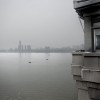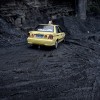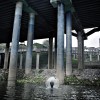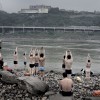O rio Yang Tse
Com um respeitável trabalho engajado em questões políticas e sociais, como a dos refugiados de países em situação de guerra, Rasmussen nesta série sobre o rio Yang Tse, um dos maiores e mais poluídosdo mundo, revela a potência narrativa do seu documentário. As imagens, que mais parecem tomadas de um filme, vão deixando pistas e sugerindo o que se passa entre uma cena e outra, revelando o lugar que o rio ocupa no imaginário e no cotidiano da China contemporânea.
Nesodden (Noruega)
The Yangtze river supplies water to one in twelve people on the planet and supports 200 cities along its length including Chongqing, the biggest municipality in the world with 31 million residents.
Mao famously swam in the river at Wuhan in July 1966, at the height of the Cultural Revolution, when at the age of 72 he was reported to have swum nine miles downstream in 65 minutes, pausing only to talk politics to a provincial party secretary and to teach the backstroke to a young lady. Foreign observers were somewhat sceptical, realising that Mao’s reported speed was considerably faster than world record pace. His successors would be unlikely to undertake a similar challenge today, as the billions of tonnes of untreated industrial waste and sewage dumped into the river every year are in serious danger of killing what remains of its animal and plant life. 80% of Chongqing’s waste flows into its rivers – over two billion tonnes annually or four tonnes every minute.
Chongqing’s own great leap forward has been propelled by the building of the Three Gorges Dam raising water levels in the city by 17 metres and enabling ocean-going ships to sail to its harbours. The combination of inexpensive electricity from the dam and cheap river transportation has opened up the city to international investment; its new industries fuelled by a constant stream of rural migrants increasing the city’s population by half a million every year. But there are serious downsides: the flow of the water is now too slow to flush pollution out of the river system and sudden landslides along its banks have created waves up to 50 metres high.
Undeterred, local people continue to swim in the river claiming it is cleaner than five years ago, although it is difficult to know quite how they have come to this conclusion. The Chinese government has commissioned 20 new wastewater treatment plants in the area, but it has a difficult job on its hands – Chongqing’s population is forecast to double in the next decade.
The Yangtze series is part of an on-going project titled “Anthropocene—Age of Man”: It’s a new name for a new geologic epoch—one defined by our own massive impact on the planet. That mark will endure in the geologic record long after our cities have crumbled.










Recent Comments